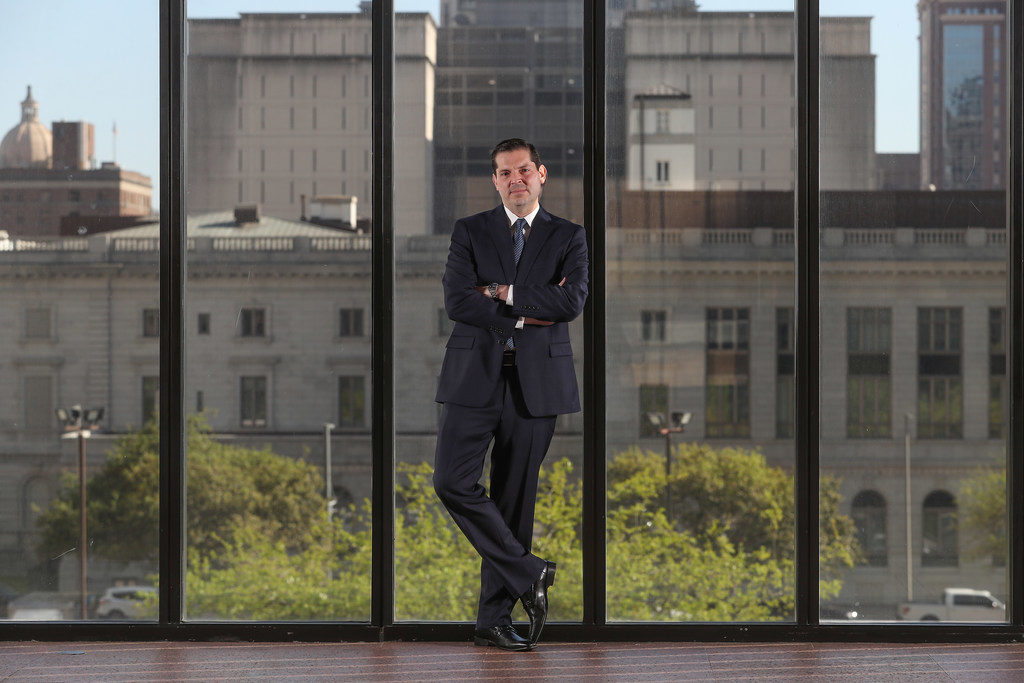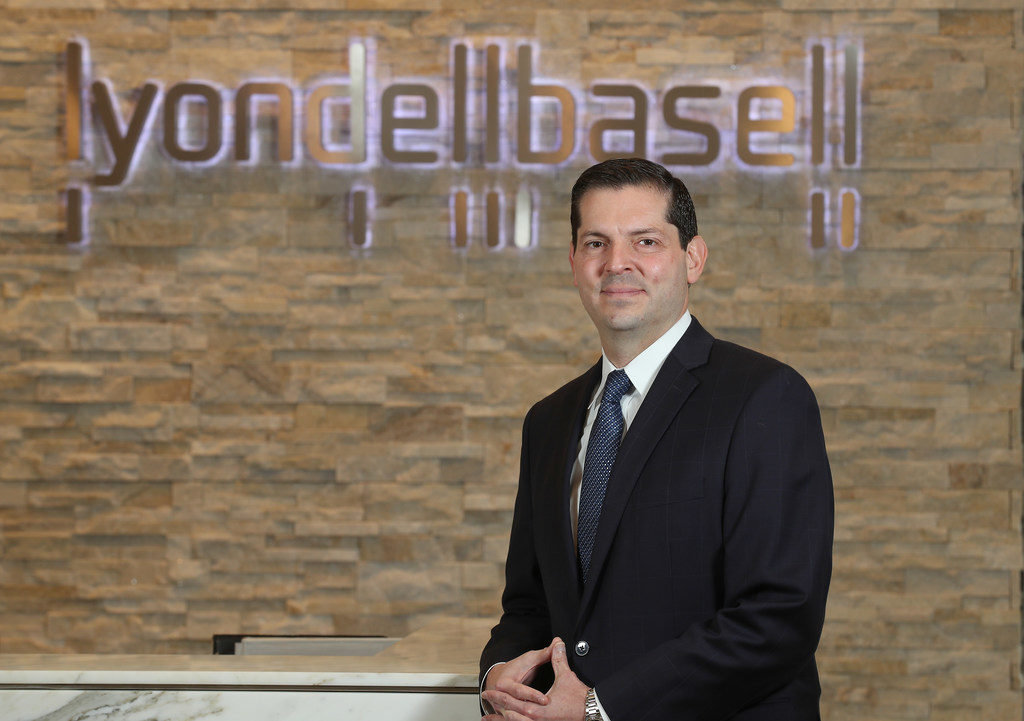
Andrew Gratz had been on the job as a senior in-house corporate lawyer at Houston-based LyondellBasell for about three months when his boss called him at home.
“He told me that we were about to file bankruptcy and asked if I wanted to be on the team preparing the company for bankruptcy,” Gratz told The Texas Lawbook in an exclusive interview. “I had never been involved in a bankruptcy before. It was new to all of us.”
Gratz, feeling both nervous about his job security and excited to be part of an obviously transformational assignment, agreed.
“Every single day, we were never sure we would have a job at the end of the day,” he said. “There were a lot of goodbye parties every few days at the Flying Saucer. Every Friday, we would wait to see if our paychecks cleared the bank. Seriously, I’m not kidding.”
Gratz played a critical role in LyondellBasell’s extremely complex and highly successful restructuring and is now the company’s associate general counsel for commercial and strategic transactions.
Despite being only 42, Gratz’s recent accomplishments at LyondellBasell are significant, including:
- Last year, he guided the $35 billion multinational petrochemical corporation through its $2.25 billion acquisition of A. Schulman Inc. – the company’s first major transaction since it exited from bankruptcy in April 2010.
- He leads LyondellBasell’s cross-border M&A activity for the legal team.
- He served as lead of corporate compliance, which required that he educate and trained many of the company’s 14,000 employees in 32 countries about anti-corruption and antitrust matters, data privacy protections and other compliance concerns.
- He and his team also recently developed the company’s global processes to proactively and efficiently address trade issues and force majeure events to better support its commercial activities.
Citing his multiple recent achievements, the Houston Chapter of the Association of Corporate Counsel and The Texas Lawbook have named Gratz a finalist for the 2019 Houston Corporate Counsel Award’s Senior Counsel of the Year for a Large Legal Department.
The ACC Houston and The Texas Lawbook are honoring the finalists and announcing the winners on Thursday, April 25, at a ceremony at the Four Seasons Hotel in downtown Houston.
George Casey, a partner at Shearman & Sterling, said that the Schulman acquisition was such a huge success for LyondellBasell because of Gratz’s leadership.
“Andrew led a large team and was directly involved in all aspects of the transaction, working seamlessly with outside legal and financial advisors and consultants from early analysis to due diligence, complex structuring, negotiations of deal documents, regulatory filings and ultimately integration planning and preparation for closing,” said Casey, who was one of three lawyers who nominated Gratz’s for the award. “His focus on detail while keeping a strategic perspective of the transaction allowed for a very efficient process and a highly successful outcome.
“Andrew’s experience is combined with outstanding personal traits – he is very collegial, even-keeled and calm even in the most demanding, stressful and fast paced situations in the middle of transactions,” Casey said.
Allen & Overy partner Katinka Middelkoop, who has worked with LyondellBasell on a handful of cross-border deals and also nominated Gratz for the honor, said he possesses tremendous legal and business acumen.
“Andrew has a great business sense and understanding of cultural differences,” Middelkoop said. “He is very smart, dedicated and practical. This makes him a true problem solver and bridge builder.”
LyondellBasell Chief Legal Officer Jeff Kaplan describes Gratz as “freakishly smart and very tenacious.”
“Andrew is a Swiss Army knife in that he has several practice areas in his background and he has mastered all of them,” Kaplan told The Texas Lawbook in an interview last year.
Born in the Bronx, Gratz moved with his family to Las Vegas in 1984 when he was seven. His father worked for several years as a security officer at a casino at night.
An early memorable moment for Gratz came in 1992 when he was a junior in high school and watched the inauguration of President Bill Clinton as part of his government class.
“I was transfixed – everything about it was fascinating,” he said. “I wanted to go to the nation’s capital for college and I went to American University with every intent of getting into politics.”

While in Washington, D.C., he gained invaluable experience working in a congressional office on Capitol Hill, with a public policy newsletter and for the American Gaming Association, a trade group for the casino industry.
Gratz was the first person in his family to go to college. While in school, he worked for a member of Congress. Upon graduation, he moved back to Nevada where he worked on political campaigns.
“I helped work on three campaigns and we lost all three races,” said Gratz, who also attended the 1996 Republican National Convention in San Diego. “I decided then that politics was not for me.”
At the time, Gratz was dating a woman who lived in Texas. So, he applied to the University of Houston Law Center. The law school accepted him and so did his girlfriend, as they were later married.
“There were no lawyers in my family, and the only basis I had for being a lawyer was what I had seen on TV and I decided I would be a litigator,” he said.
Gratz joined the litigation section of Gardere in 2002, where he focused on labor and employment cases and commercial disputes.
“Not long after I started practicing, I knew something wasn’t right and that I wasn’t enjoying the job,” he said. “I learned that it wasn’t the practice of law I disliked, it was litigation. In litigation, each party is aiming for a different target. There’s no shared goal. It just wasn’t for me.”
Gratz started taking classes to obtain his Master of Business Adminstration degree with the full intent of leaving the practice of law.
In 2004, Gardere moved him to its M&A practice in Houston in 2004, which he enjoyed much more.
“Corporate work allowed me to collaborate and work with people to accomplish the same goal,” he said.
Gratz received his MBA from the University of Texas in Dallas in 2006. A few weeks later, he accepted an offer from Baker Botts, where he spent two years working on mergers, acquisitions, securities and corporate governance.
In the summer of 2008, a recruiter called Gratz to entertain his interest in going in-house.
“While I was happy at Baker Botts, the idea of going to work as a part of a large global energy company was exciting,” he said. “I liked the idea of working for one client and helping that client achieve its strategic and commercial goals.”
A few weeks later, he started as a senior lawyer in the legal department at the then-newly merged LyondellBasell, one of the largest petrochemical companies in the world. At the time, LyondellBasell had about 50 attorneys in-house.
Then came the bankruptcy.
“The bankruptcy was an incredibly intense experience,” he said. “Long hours, late nights and lots of weekends. It didn’t matter because we all had one goal in mind – the company’s survival.
“Truthfully, there were times when we didn’t think the company was going to emerge from bankruptcy,” he said.
LyondellBasell filed its Chapter 11 petition in January 2009, as the credit markets were collapsing and the country was in the midst of the Great Recession.
Even so, the bankruptcy was extremely successful, allowing the company to shed more than $20 billion in debt.
After 15 months, LyondellBasell exited bankruptcy as a strong and focused business operation. A few months later, the company was listed on the New York Stock Exchange.
Gratz was awarded a new assignment: lead a multidisciplinary and multifunctional effort to draft the company’s “Delegation of Authorities” policy.
“The merger of Lyondell and Basell took place in 2007, but the business units and functions – including the legal departments – were still operating separately,” he said. “Our mission in drafting a policy was to align and fully integrate Lyondell and Basell’s values and instill a culture of responsibility and accountability.”
The Delegation of Authorities policy developed by Gratz and the team is essentially LyondellBasell’s global internal controls policy that governs the authority of officers, directors and employees to make decisions relating to the human, financial and physical resources of the company.
That same year, 2010, Gratz provided primary legal support to company officials in the sale of its flavors and fragrances business unit to Pinova Holdings for more than $150 million.
In 2015, LyondellBasell promoted Gratz and gave him the title Lead Compliance Counsel, which was a major position in a company of 14,000 employees and 55 manufacturing sites in 32 countries. For two years, he traveled the world, educating and training his colleagues about anti-corruption and antitrust matters, data privacy protections and other compliance concerns.
Between 2011 and 2016, LyondellBasell did very little M&A. That changed in April 2017 when the company started building up its business development efforts. Kaplan appointed Gratz to be the corporate development group’s chief legal counsel.
In February 2018, LyondellBasell announced its $2.25 billion purchase of A. Schulman – an acquisition that resulted in the world’s largest compounding business.
“The success of this deal was due in no small part to Andrew’s effective counsel,” said Freshfields partner Omar Pringle, who was not involved in the transaction. “Andrew’s broad range of experience and intellectual curiosity give him a firm grasp on a variety of legal and commercial issues and allows him to focus on what is important.”
Gratz said the acquisition had multiple complexities that required his deal team to be creative.
“There was a lot of pressure on us because this was our first big deal since the bankruptcy,” he said. “A significant issue in the transaction was the development of a structure that could provide the seller’s shareholders with the benefit of any recoveries resulting from certain pending litigations, where the outcome was uncertain and any recoveries likely not received until after the transaction closed.
“The administration of the matters being litigated, allocation of litigation costs and payment of any recoveries to seller’s shareholders, among other terms, needed to be determined,” he said.
Gratz and his team made it part of the agreement that A. Schulman shareholders would receive cash and contingent value rights, known in M&A circles as CVRs.
“The use of CVRs in this transaction is noteworthy, as CVRs are highly unusual in non-pharmaceutical M&A transactions,” Gratz said. “However, to get the deal done and advance the strategic goals of the company, we decided to propose creative ideas to bridge the parties’ fundamental differences in valuation.”
Latham & Watkins partner Ryan Maierson said Gratz’s “diverse perspectives on the company’s business and goals” make him an “invaluable resource as a deal runner.”
“Andrew strikes a terrific balance of being both a deal leader who is able to push transactions forward and a willing and capable listener who shows great respect for his team,” Maierson said. “Like all excellent in-house lawyers, he thinks beyond purely legal issues, taking into account the strategic considerations that underpin the deal for LyondellBasell.”
Gratz, who also was recognized last year by the Texas General Counsel Forum and the Financial Times for his legal and business acumen, said it is an “exciting time to be a deal lawyer” at LyondellBasell.
“Jeff [Kaplan] really believes in empowering his team and he’s interested in taking everyone to the next level,” he said. “As a result, I’m a big believer in training people well enough so that they can leave, but treating them well enough so they won’t want to.”
